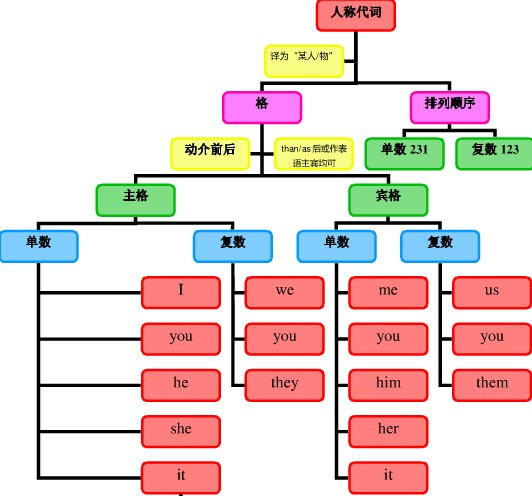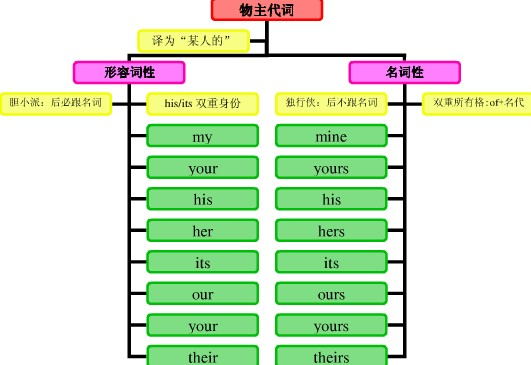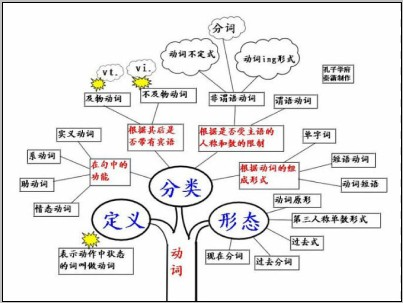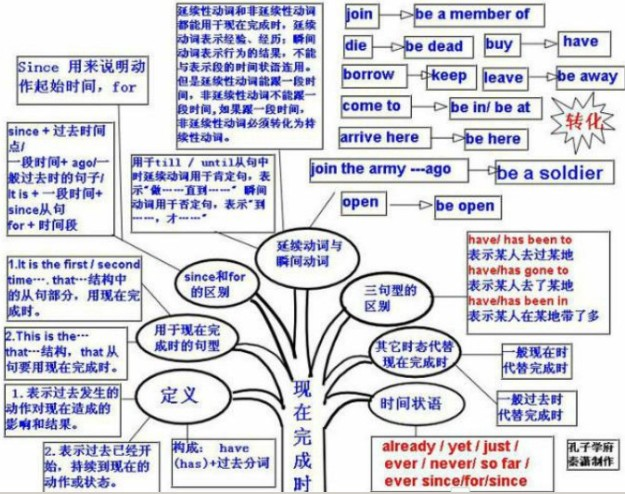本试题 “短文改错。下面短文中有10处语言错误。请在有错误的地方增加、删除或修改某个单词。增加:在缺词处加一个漏字符号(∧),并在其下面写上该加的词。删除:把多...” 主要考查您对人称代词
物主代词
介词和介词短语
动词
现在分词
一般过去时
现在完成时
等考点的理解。关于这些考点您可以点击下面的选项卡查看详细档案。
- 人称代词
- 物主代词
- 介词和介词短语
- 动词
- 现在分词
- 一般过去时
- 现在完成时
人称代词的概念:
人称代词是替代我、你、他、她、它、我们、你们、他们、她们、它们等人称的词。
人称代词分为主格和宾格形式,并有人称的单复数形式。按所替代人称的不同分为第一人称、第二人称和第三人称。
人称代词的用法:
人称代词在句中可以用作主语(用主格,如:I,you,he,she,we,they,等)和宾语(用宾格,如 me,you,him,her,us,them等)
如:He loves her, but she hates him. 他爱她,但她却讨厌他。
注:(1)在口语中,当人称代词用作表语、用于than, as之后或用于强调句中被强调时,可以用语。 例如:
"Who is it?" "It's me."“是谁呀?”“是我。”
He sings better than me. 他比我唱得好。
He is as tall as her. 他和她一样高。
It's me who did it. 这是我干的。但是,若than,as后的人称代词后跟有动词,则必须用主格。例如:
He sings better than I do./ He is as tall as she is.
(2)单独使用的人称代词通常用宾格。
"I' m tired.""Me too."“我累了。”“我也累了。”
"Who wants this?" "Me."“谁要这个?”“我要。”
(3)有时用主格或宾格会导致意思的变化。
I like you better than he. 我比他更喜欢你。为 I like you better than he likes you. 之略。
I like you better than him. 我喜欢你胜过喜欢他。为 I like you better than he likes him. 之略。
人称代词主格、宾格、人称、单复数对比:
|
人称代词 |
单数 |
复数 | ||
|
主格 |
宾格 |
主格 |
宾格 | |
|
第一人称 |
I |
me |
we |
us |
|
第二人称 |
you |
you |
you |
you |
|
第三人称 |
he |
him |
they |
them |
|
she |
her |
them | ||
|
it |
it | |||
人称代词的排序:
人称代词的排列顺序为:单数人称代词通常按“二三一”排列,即you, he and I;复数人称代词通常按“一二三”排列,即we, you and they:
You, he and I are of the same age. 你,他和我都是同一年龄。
We, you and they are all good citizens. 我们,你们和他们都是好公民。
但若是用于承担责任或错误等场合,则可把第一人称I置于其他人称代词之前:
I and Tom are to blame. 我和汤姆该受批评。
比较:Tom and I hope to go there. 汤姆和我想去那儿。
注意:you and I 是固定结构,语序通常不宜颠倒。
人称代词知识体系:

人称代词用法拓展:
1、在通常情况下,人称代词在句子中出现在它所代替的名词之后,即先出现名词,再出现相应的代词。但是,在书面语中,有时也可出现代词,后出现代词所代替的名词。
As soon as it had hopped off, the plane picked up speed.飞机刚一起飞,就加了速。
(比较:As soon as the plane had hopped off, it picked up speed.)
2、人称代词后跟名词同位语。有些人称代词后有时可跟同位语。
These small desks are forus students.这些小课桌是给我们学生的。
We girls often go to the movies together.我们女孩子常一起去看电影。
He asked you boys to be quiet.他要你们男孩子安静些。
物主代词的概念:
表示所有关系的代词叫物主代词。
物主代词有两种形式:一种是形容词性物主代词,在句中只能充当定语;另一种是名词性物主代词,和名词用法相同,在句中作主语、宾语、表语等。
物主代词的特性:
1、物主代词既有表示所属的作用又有指代作用。
例如:John had cut his finger;约翰割破了手指。
物主代词有形容词性(my,your等)和名词性(mine,yours等)两种,形容词性的物主代词属于限定词。
名词性的物主代词在用法上相当于省略了中心名词的“'s”属格结构,
如:Jack's cap 意为 The cap is Jack's.
His cap 意为 The cap is his.
2、名词性物主代词的句法功能:
a.作主语,例如:May I use your pen? Yours works better.
b.作宾语,例如:I love my motherland as much as you love yours.
c.作介词宾语,例如:Your should interpret what I said in my sense of the word,not in yours.
d.作主语补语,例如:The life I have is yours. It's yours. It's yours. 我的生命属于你,属于你,属于你。
物主代词的基本形式:
|
第一人称 |
第二人称 |
第三人称 | ||||
|
|
|
名词性 |
形容词性 |
名词性 |
形容词性 |
名词性 |
|
单数 |
my |
mine |
your |
yours |
his |
his |
|
复数 |
our |
ours |
your |
yours |
theirs | |
形容词性物主代词的用法:
1、形容词性物主代词通常修饰名词,作定语。
如:We should treat her mother very well.
2、与own连用表示强调。
如:I saw it with my own eyes.
名词性物主代词的用法:
1、名词性物主代词可作主语、表语和宾语。
如:This is my desk. Yours is over there.
2、名词性物主代词常用于双重属格,于of连用。
如:This girl is a friend of mine.
物主代词知识体系:

物主代词特别用法:
1、名词性和形容词性物主代词不能混用。
如:Jack has a low opinion of Sue.
2、物主代词的单复数必须和它所指代的名词一致。
如:His idea is to do more practice every day.
3、对于anyone,anybody,everyone,everybody,应根据上下文来判断his或her,有时也可用their。
如:Has everyone finished their work?
介词和介词短语的概念:
介词是一种用来表示词与词、词与句之间的关系的虚词,在句中不能单独作句子成分。介词后面一般有名词、代词或相当于名词的其他词类,短语或从句作它的宾语。介词和它的宾语构成介词词组,在句中作状语,表语,补语或介词宾语。介词可以分为时间介词、地点介词、方式介词和其他介词。
误用介词的三种情况:
1、多用介词:
多用介词可能是受汉语意思的影响将及物动词误用作不及物动词,也可能是受相关结构的影响而用错:
误:We discussed about the plan.
正:We discussed the plan. 我们讨论了计划。
误:Did he mention about the accident?
正:Did he mention the accident? 他提到那次事故了吗?
误:I saw her enter into the bank.
正:I saw her enter the bank. 我看见她进了银行。
误:He married with[to] a nurse.
正:He married a nurse. 他同一位护士结了婚。
误:How can contact with you?
正:How can contact you? 我怎么与你联系?
误:We should serve for the people heart and soul.
正:We should serve the people heart and soul. 我们应该全心全意地为人民服务。
误:Who controls over the factory? (但名词control可接over)
正:Who controls the factory? 谁管理这个工厂?
误:He has a great many of friends here. (比较a great number of)
正:He has a great many friends here. 他在这儿有很多朋友。
2、漏用介词:
漏用介词可能是受汉语意思的影响将不及物动词误用作及物动词,或是受相关结构的影响的影响而用错等:
误:This matter is difficult to deal. (deal with=处理)
正:This matter is difficult to deal with. 这事很难处理。
误:He is not a man to be depended.
正:He is not a man to be depended on. 他不是个可靠的人。
误:He took a cup of tea, and went on the story.
正:He took a cup of tea, and wentonwiththestory.他喝了一口茶,又接着讲故事。
误:My mother still regards me a child. (比较consider…as中的as可省略)
正:My mother still regards me as a child. 我母亲还把我当小孩看。
误:They insisted sending a car over to fetch us.
正:They insisted on sending a car over to fetch us.他们坚持要派车来接我们。
误:What he says is worth listening.
正:What he said is worth listening to.他的话值得一听。
3、错用介词:
错用介词的情况比较复杂,可能是因受汉语意思的而错,也可能是因弄不清搭配关系而错,可能是混淆用法而错,也可能是受相关结构的影响而错,可能是忽略语境而错,也可能是想当然的用错:
误:She called on his office yesterday. (call on+人,call at+地点)
正:She called at his office yesterday. 她昨天去了他办公室拜访。
误:He is engaged with a nurse.
正:He is engaged to a nurse.他与一位护士订了婚。
误:The sun rises from the east.
正:The sun rises in the east.太阳从东方升起。
误:Under his help, I finished it in time.
正:With his help, I finished it in time. 在他的帮助下,我及时做完了。
误:During he was in Japan, he visited many places.
正:During his stay in Japan, he visited many places.他在日本期间,参观过许多地方。
误:We are familiar to his character.
正:We are familiar with his character.我们了解他的性格。
误:Help yourself with the fruit.
正:Help yourself to the fruit.吃点水果吧。
介词的宾语:
1、名词或代词作介词宾语:
如:Are you interested in history? 你对历史感兴趣吗?
Don't worry about it. 别为它担心。
注:若是人称代词用作介词宾语,要注意用宾格。
如:No one can sing like her. 没有人能像她那样唱歌。(不能用like she)
2、动名词作介词宾语:
如:He is good at telling stories. 他善于讲故事。
In crossing the street he was run over. 他在穿过马路时被汽车撞倒。
3、过去分词作介词宾语:
如:We can't regard the matter as settled. 我们不能认为这事已经解决。
I take it for granted you have read the book. 我以为你读过这本书。
注:过去分词用作介词宾语通常只见于某些固定结构中,如上面第1句涉及regard…as(认为…是)结构,第2句涉及take sth for granted(认为某事属实)。在其他情况下,介词后通常不直接跟过去分词作宾语,若语义上需要接过去分词(表被动),可换用“being+过去分词”:
如:He went out without being seen by the others.他出去了,没有被其他人看见。
4、从句作介词宾语:
如:He was not satisfied with what she said. 他对她说的不满意。
I'm worried about where he is. 我担心他上哪儿去了。
注:介词后通常不接that从句,遇此情况需考虑用其他结构:
误:He paid no attention to that she was poor.
正:He paid no attention to the fact that she was poor. 他根本不注意她很穷这一事实。
但有个别介词(如except)可接that从句。
比较:I know nothing about him except that he lives next door./I know nothing about him except for the fact that he lives next door. 我只知道他住在隔壁,其它的就不知道了。
5、不定式作介词宾语:
如:I had no choice but to wait. 除了等,我没有别的选择。
He wanted nothing but to stay there. 他只想留在那儿。
They did nothing but complain. 他们老是一个劲地抱怨。
He never did anything but watch TV. 除了看电视,他从不干任何事。
注:(1)介词后接不定式的情形通常只见于but, except等极个别个词。该不定式有时带to,有时不带to,其区别是:若其前出现了动词do,其后的不定式通常不带to;
若其前没有出现动词do,则其后的不定式通常带to。
(2)介词后虽然通常不直接跟不定式作宾语,但却可接“连接代词(副词)+不定式”结构:
如:He gave me some advice on how to do it. 对于如何做这事他给我提了些建议。
6、形容词作介词宾语:
如:Her pronunciation is far from perfect. 她的语音远不是完美的。
In short, we must be prepared. 总而言之,我们要有准备。
Things have gone from bad to worse. 事情越来越糟。
注:(1)有些形容词用作介词宾语可视为其前省略了动名词being:
如:He regarded the situationas(being) serious. 他认为形势严重。
His work is far from(being) satisfactory. 他的工作丝毫不令人满意。
(2)有些“介词+形容词”的结构已构成固定搭配:in full全部地,全面地,无省略地; in private私下地,秘密地; in particular特别地;in general一般地,通常地,概括地; in brief 简言之;in short总之,简言之; in vain徒然地,徒劳无益地;for fee免费地,无偿地; for certain肯定地,确切地;for sure肯定地,确切地; for short为了简短,简称;atl arge自由自在地,逍遥法外; by far…得多
7、副词作介词宾语:
如:I can't stay for long. 我不能久呆。
It's too hot in here. 这里面太热了。
I looked every where except there. 除了那儿,我到处都看过了。
8、数词作介词宾语:
如:The city has a population of four million. 这座城市有四百万人口。
He was among the first to arrive. 他是第一批到的。
9、介词短语作介词宾语:
如:Choose a book from among these. 从这些书中选一本吧。
I saw her from across the street. 我从街的对面望见了她。
注:通常可后接介词短语作宾语的介词是from, till, until, since, except, instead of等。
比较:I took it from the bed. 我从床那儿(或床上)拿的。
I took it from under the bed. 我从床下拿的。
10、复合结构用作介词宾语:
如:She had no objection to Mary marrying him. 她不反对玛丽与他结婚。
She came in with a book in her hand. 她手里拿着一本书走了进来。
All the afternoon he worked with the door locked. 整个下午他都锁着门在房里工作。
介词短语的句法功能:
1、表语:
如:He was with a friend. 他和一个朋友在一起。
Health is above wealth. 健康胜过财富。
This knife is for cutting bread. 这把小刀是用于切面包的。
注:有些介词(如because of)引出的短语通常只用作状语,不用作表语:
误:His absence is because of the rain.
正:His absence is due to the rain. 他因雨未来。
但是,若主语是代词(不是名词),becauseof引出的短语可用作表语:
如:It is because of hard work. 那是因为辛苦工作的原因。
2、状语:
如:Don't touch it with your hands. 别用手去摸它。
Did you do this by design or by accident? 你这样做是有意的还是无意的?
3、定语:
如:This is his reply to your letter. 这是他给你的回信。
This is the best way of doing it. 这是做此事最好的方法。
My love for you is deeper than the sea. 我对你的爱比海深。
4、宾语补足语:
如:I found everythingin good condition. 我发现一切正常。
Her illness kept her in bed for a week. 她因生病在床上躺了一星期。
注:用作宾语补足语的介词短语在相应的被动语态中则为主语补足语:
如:He was regarded as a hero. 他被看成是英雄。
5、宾语:
如:A man stepped out from behind the wall. 一个人从墙后走出来。
He cannot spare anytime except on Sunday. 除星期日外,他抽不出时间。
6、主语:
如:Between6 and 7 suits me. 六点到七点对我比较适合。
After the exams is the time to relax. 考试后是轻松一下的时间。
注:介词短语通常不用作主语,尽管有时也像上面这样用作主语,但通常可视为是在一定的上下文中有所省略:
如:—When are we going to have the next meeting? 我们下次什么时候见面?
—On Tuesday may be convenient. 星期二可能比较方便。
此句中onTuesday虽用作主语,但可视为是其前省略了meeting一词:
即:Meeting during the vacation may be convenient.
动词的定义:
表示动作中状态的词叫做动词。根据其在句中的功能,动词可分为行为动词、系动词、助动词和情态动词四类,有些动词是兼类词。
例如:We have lunch at 12. (have是行为动词)
We have been to NewYork. (have是助动词)
I am hungry. (am是系动词)
You need not have waited for me. (need是情态动词)
The door needs painting. (need是兼类词)
动词的分类:
1)表示动作中状态的词叫做动词。
2)根据其在句中的功能,动词可分为四类,分别是:
实义动词(Notional Verb)、系动词(Link Verb)、助动词(Auxiliary Verb)、情态动词(Modal Verb)。
说明:有些情况下,有些动词是兼类词。
例如:We are having a meeting. 我们正在开会。(having是实义动词。)
He has gone to NewYork.他已去纽约。(has是助动词。)
3)动词根据其后是否带有宾语,可分为两类,分别是:
及物动词(Transitive Verb)、不及物动词(Intransitive Verb),缩写形式分别为vt.和vi.。
说明:同一动词有时可用作及物动词,有时可用作不及物动词。
例如:She can dance and sing. 她能唱歌又能跳舞。(sing在此用作不及物动词。)
She can sing many English songs. 她能唱好多首英文歌曲。(sing用作及物动词。)
4)根据是否受主语的人称和数的限制,可分两类,分别是:
限定动词(Finite Verb)、非限定动词(Non-finite Verb)。
例如:She sings very well. 她唱得很好。(sing受主语she的限制,故用第三人称单数形式sings。)
She wants to learn English well. 她想学好英语。(to learn不受主语she的限制,没有词形变化,是非限定动词。
说明:英语中共有三种非限定动词,分别是:动词不定式(Infinitive)、动名词(Gerund)、分词(Participle)。
5)根据动词的组成形式,可分为三类,分别是:
单字词(One-Word Verb)、短语动词(Phrasal Verb)、动词短语(Verbal Phrase)
例如:The English language contains many phrasal verbs and verbal phrases. 英语里有许多短语动词和动词短语。(contains是单字动词。)
Students should learn to look up new words in dictionaries. 学生们学会查字典。(look up是短语动词。)
The young ought to take care of the old. 年轻人应照料老人。(takecareof是动词短语。)
6)动词有五种形态,分别是:
原形(OriginalForm)、第三人称单数形式(Singular From in Third Personal)、过去式(Past Form)、过去分词(Past Participle)、现在分词(Present Participle)。
动词知识体系:

现在分词的概念:
现在分词(PresentParticiple)(又称-ing形式),是分词的一种,是非限定动词,即在句子里面不能单独充当谓语,但能充当其它的一些成分(定语,表语,补语和状语)。一般式:doing;一般被动式:being done;完成式:having done;完成被动式:having been done。所有否定式都是在-ing前面加not。
现在分词的用法:
1)做表语:
如:He was very amusing.
That book was rather boring.
很多动词的现在分词都可以作表语:exciting, interesting, encouraging, disappointing, confusing, touching, puzzling.
2)作定语:
上面所出现的现在分词都可以用作定语,修饰一个名词:
如:That must have been a terrifying experience.
I found him a charming person.
现在分词短语还可以放在名词的后面修饰名词,相当于一个定语从句:
如:There are a few boys swimming in the river.
There is a car waiting outside.
3)作状语:
现在分词短语可以表示一个同时发生的次要的或伴随的动作:
如:Following Tom, we started to climb the mountain.
Opening the drawer, he took out a box.
Taking a key out of his pocket, he opened the door.
现在分词短语还可以表示原因,相当于一个原因状语从句:
如:Not knowing her address, we couldn't get in touch with her.
Being unemployed, he hasn't got much money.
现在分词短语还可以表示时间,相当于一个时间状语从句:
如:Hearing the news, they all jumped with joy.
Returning home, he began to do his homework.
Jim hurt his arm while playing tennis.
Be careful when crossing the road.
Having found a hotel, we looked for some where to have dinner.
Having finished her work, she went home.
4)作宾补:
现在分词在一些动词之后可以做宾语的补语:
例如:see, hear, catch, find, keep, have等。
如:I see him passing my house every day.
I caught him stealing things in that shop.
I smelt something burning.
She kept him working all day.
现在分词其他用法解析:
1、现在分词一般式的用法:
现在分词的一般式所表示的动作与主语动作同时发生:
如:When we arrived, we found him sleeping. 我们到达时发现他在睡觉。
Living in the 示的动作也可略早于或迟于谓语动作,但两者之间没有时间间隔:
如:Seeing nobody at home, he decided to leave a note. 发现没有在家,他决定留个字条。
He went home, finding the door locked. 他回到家,发现门是锁着的。当现在分词所表示的动作略迟于谓语动作时,现在分词通常位于句末。
2、现在分词完成式的用法:
现在分词的完成式主要表示发生在谓语动作之前的动作:
如:Having been there once, she knew the place quite well. 由于去过那儿一次,她对那地方很熟悉。
Having failed twice, he didn't want to try again. 他已经失败了两次,不想再试了。
注:(1)现在分词的一般式和完成式均可表示已完成或先于谓语的动作,但有区别:现在分词所表示的动作虽然可以先于谓语动作,但两者之间没有时间间隔,而现在分词的完成式所表示先于谓语的动作则与谓语动作有一定的时间间隔:
如:Locking the door, he went out. 锁好门之后,他就出去了。
Having invited him here to speak, we'd better go to his lecture. 既然我们请了他来作报告,我们最好去听一下。
有时即使是分词动作与谓语动作几乎同时发生,但如果要强调分词动作的完成性,也应用现在分词的完成式:
如:Having bought our tickets, we went into the theatre. 我们买好票后就走进剧场。
(2)现在分词的完成式一般不用作定语:
误:Do you know anyone having lost a cat? 你知道有谁丢了一只猫吗?
误:I want to talk to the person having broken the window. 我想同打破窗户的人谈谈。
若将以上现分词的完成式改为一般式也不可以(因为现在分词作后置定语时通常只表示与谓语动作同时或几乎同时发生的动作,而不能先于谓语动作而发生):
误:I want to talk to the person breaking the window.
3、现在分词被动式的用法:
当要表示一个被动动作时,现在分词就用被动形式。现在分词的一般式和完成式均有被动式形式:
(1)现在分词一般式的被动式:主要表示现在正在进行的动作,也可表示与谓语动作同时发生的动作:
如:Who is the woman being operated on? 正在动手术的女人是谁?
I saw him being taken away by the police. 我看见他被警察带走。
注:有时现在分词一般式的被动式所表示的动作也可发生在谓语动作之前(此时的现在分词通常用于表示原因,且多为状态动词):
如:Not having a car, he finds it difficult to get around. 由于没车,她感到行动很困难。
(2)现在分词完成式的被动式:主要表示发生在谓语动词之前且已经完成的动作。
如:The subject having been opened, he had to go on with it. 话题已经开始了,他不得不谈下去。
Having been written inhaste, the book has many mistakes. 这书因写得仓促,所以错误不少。
比较:Being so ill, she can't go to school. 由于病得那么严重,她不能去上学。
Having been ill for a long time, he needed time to recover. 由于病了很长时间,他需要一段恢复的时间。
一般过去时的概念:
一般过去时表示过去某个时间里发生的动作或状态;过去习惯性、经常性的动作、行为;过去主语所具备的能力和性格。
一般过去时的用法:
1、表示过去发生的动作或存在的状态,常与表示过去时间的副词如:yesterday,last week,two hours ago等连用。
如:My family moved here five years ago. 我家五年前搬到了这里。
I was born in 1973. 我生于1973年。
2、表示过去一段时间经常或反复发生的动作。这时可与频度副词如:often,usually,always等连用。
如:He always worked in tonight those days. 那些日子他总是工作到深夜。
I often left on business in 1987. 1987年我经常出差。
注:表示“过去经常,而今不再”时,要用usedto.
如:I used to read newspaper after breakfast. 我过去经常早饭后看报纸。(意指现在已不是这样)
The children often swam in this river. 孩子们过去经常在这条河里游泳。
3、表示过去发生的一连串动作。
如:He put down the heavy box, took out the keys, and opened the door. 他放下这沉重的箱子,掏出钥匙开了房门。
注:过去发生的一连串动作,若用and,or,but等并列连词连接,则一律用过去式。
如:They moved the chairs to the table, sat down and began to have supper. 他们把椅子搬到桌边,坐下开始吃饭。
4、在时间和条件状语从句中,用一般过去时表示过去将来的动作。
如:He said that he would let me know as soon as he got the information. 他说他一得到消息就立即让我知道。
Mary told me that she would stay at home if it rained. 玛丽告诉我如果下雨她就呆在家里。
一般过去时的特别用法:
1、句型:It is time for sb. to do sth "到……时间了" "该……了"。
例如:It is time for you to go to bed.你该睡觉了。
It is time that sb.did sth. "时间已迟了" "早该……了"。
例如:It is time you went to bed. 你早该睡觉了。
2、would(had)rather sb.did sth. 表示'宁愿某人做某事'。
例如:I'd rather you came tomorrow. 还是明天来吧。
3、wish, wonder, think, hope等用过去时,作试探性的询问、请求、建议等,而一般过去时表示的动作或状态都已成为过去,现已不复存在。
例如:I thought you might have some. 我以为你想要一些。
比较:Christine was an invalid all her life.(含义:她已不在人间。)
Christine has been an invalid all her life.(含义:她现在还活着)
Mrs. Darby lived in Kentucky for seven years.(含义:达比太太已不再住在肯塔基州。)
Mrs. Darby has lived in Kentucky for seven years.(含义:现在还住在肯塔基州,有可能指刚离去)
注意:用过去时表示现在,表示委婉语气。
1)动词want, hope, wonder, think, intend等。
例如:Did you want any thing else? 您还要些什么吗?
I wondered if you could help me. 能不能帮我一下。
2)情态动词could, would。
例如:Could you lend me your bike? 你的自行车,能借用一些吗?
现在完成时的概念:
现在完成时用来表示之前已发生或完成的动作或状态,其结果的影响现在还存在;也可表示持续到现在的动作或状态。其构成:have(has)+过去分词。
现在完成时共有四种主要用法:
一、现在完成时表示影响:
该用法的现在完成时表示一个过去发生的动作在过去已经完成,并且这个过去发生并完成的动作对现在有影响或结果,同时说话者强调的或感兴趣的就是这个影响或结果,如汉语说“他已离开这个城市了”,其中的“离开”肯定发生了,它对现在的影响或结果就是“他现在已不在这个城市了”;又如汉语说“有人把窗户打破了”,显然“打破窗户”这一动作发生在过去,并且在过去已经完成了,但说话人强调的重点是打破窗户对现在的影响—窗户现在仍是破的。
如:He has left the city. 他已离开这个城市。(结果:他不在这个城市。)
Someone has broken the window. 有人把窗户打破了。(结果:窗户仍破着。)
I have lost my pen. 我把钢笔丢了。(结果:我现在无钢笔用。)
He has finished his work. 他把工作做完了。(结果:他现在可以做其他的事了。)
二、现在完成时表示持续:
该用法的现在完成时表示一个过去发生的动作或开始的状语在过去并未完成或结束,而是一直持续到现在,并且有可能继续下去(也可能到此结束),如汉语说“他在我们学校教书已有30年了”,显然“他在我们学校教书”是从30年前开始,并且一直教到现在,已经持续了30年;又如汉语说“自上个星期以来他一直很忙”,显然“忙”是从上个星期开始的,并且这一“忙”就一直忙到现在。
如:He has taught in our school for 30years. 他在我们学校教书已有30年了。
He has been busy since last week. 自上个星期以来他一直很忙。
He has worked for us ever since he left school. 他离开学校以后就一直为我们工作。
三、现在完成时表示重复:
即表示从过去某个时间直到现在的这个时间范围内不断重复发生的动作或情况,并且这个不断重复的动作有可能继续下去,也有可能到现在就结束。
如:How often have you seen her? 你隔多少见她一次?
My father has always gone to work by bike. 我父亲一向骑车上班。
四、现在完成时表示将来:
同一般现在时可以表示将来一样,现在完成时也可以在时间状语从句里表示将来。
如:I'll wait until he has written his letter. 我愿等到他把信写完。
When you have rested, I'll show you the garden. 等你休息好之后,我领你看我们的花园。
现在完成时知识体系:

比较一般过去时与现在完成时:
1)一般过去时表示过去某时发生的动作或单纯叙述过去的事情,强调动作;现在完成时为过去发生的,强调过去的事情对现在的影响,强调的是影响。
2)一般过去时常与具体的时间状语连用,而现在完成时通常与模糊的时间状语连用,或无时间状语。一般过去时的时间状语:yesterday, last week,…ago, in1980, in October, just now等,皆为具体的时间状语。现在完成时的时间状语:for, since, sofar, ever, never, just, yet, till/until, up to now, in past years,always等,皆不确定的时间状语。共同的时间状语:this morning, tonight, this April, now, already, recently, lately等。
3)现在完成时可表示持续到现在的动作或状态,动词一般是延续性的,如live, teach, learn, work, study, know。一般过去时常用的非持续性动词有come, go, leave, start, die, finish, become, get married等。
例如:I saw this film yesterday.(强调看的动作发生过了)
I have seen this film.(强调对现在的影响,电影的内容已经知道了)
Why did you get up so early?(强调起床的动作已发生过了)
Who hasn't handed in his paper?(强调有卷子未交,疑为不公平竞争)
He has been in the League for three years.(在团内的状态可延续)
He has been a League member for three years.(是团员的状态可持续)
句子中如有过去时的时间副词(如yesterday, last, week, in1960)时,不能使用现在完成时,要用过去时。
(错)Tom has written a letter to his parents last night.
(对)Tom wrote a letter to his parents last night.
与“短文改错。下面短文中有10处语言错误。请在有错误的地方增加...”考查相似的试题有:
- Recycling is one way to protect the environment; reusing is ______. A.anotherB.the otherC.one anotherD.one
- I know you have much time. Please tell us about the news______.A.in detailB.in briefC.in shortD.in all
- Eric received training in computer for one year, he found a job in a big company.[ ]A. after thanB. after whichC. af...
- 短文改错。此题要求改正所有短文中的错误。对标有题号的每一行做出判断:如有错误(每行只有一个错误),则按下列情况改正:...
- In such freezing weather,water pipes are easy to and water will escape from the .[ ]A. break;breakB. crack;burstC. bu...
- I'd prefer to ________ my judgement until I find all the evidence.[ ]A. showB. expressC. passD. reserve
- ______ by a greater demand for vegetables,farmers have built more green houses.A.DrivenB.Being drivenC.To driveD....
- ____the news ,she sat down on the chair and started to cry .A.HearingB.Before hearingC.To hearD.Heard
- —Have you received their invitation to their wedding?—Not yet. And I won’t attend it even if .A.invitingB.invitedC...
- My mother went to the private school in person ________ that I would be safe there.A.confirmingB.having confirmedC...